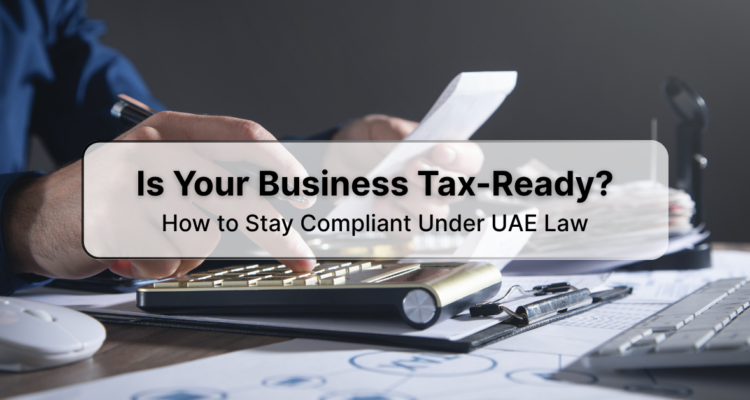The United Arab Emirates (UAE) is an attractive destination for UK entrepreneurs, offering a strategic…

Is Your Business Tax-Ready? How to Stay Compliant Under UAE Law
As the UAE continues to position itself as a global business hub, its tax framework has evolved significantly. The introduction of the federal corporate tax system in 2023 marked a turning point for businesses operating in the UAE. Whether you’re a new startup, an established SME, or a multinational corporation, it is crucial to stay compliant with the country’s tax laws to avoid penalties and ensure smooth operations.
This guide explores how businesses can ensure they are tax-ready and compliant under UAE law, covering everything from registration to ongoing reporting requirements. Read on to understand how you can meet your obligations and take advantage of the UAE’s favorable tax environment.
1. Understand the UAE Corporate Tax System
The first step in ensuring tax readiness is to understand the structure of the corporate tax system in the UAE. The introduction of a federal corporate tax system is a key development in the UAE’s tax landscape, with the goal of aligning with global tax standards while encouraging economic growth and diversification.
Corporate Tax Rates:
- 0% on taxable income up to AED 375,000 (ideal for small businesses and startups).
- 9% on taxable income exceeding AED 375,000.
- 15% Domestic Minimum Top-Up Tax for large multinational enterprises (MNEs) with global revenues of EUR 750 million or more.
The tax system is designed to balance competitiveness with international compliance, making it important for businesses to assess how these rates affect their operations.
2. Register for Corporate Tax with the FTA
One of the most critical steps to staying compliant is ensuring your business is properly registered for corporate tax with the Federal Tax Authority (FTA). Regardless of your business size or sector, all entities in the UAE must register for corporate tax.
Key Points:
- New Businesses: Must register within three months of obtaining their trade license.
- Existing Businesses: Must register within the same month their trade license was issued.
- Free Zone Entities: Free Zone businesses must also register if they exceed certain thresholds or are involved in non-exempt activities.
Failure to register within the prescribed timelines can lead to hefty fines, starting at AED 1,000 and increasing for repeated violations. Registration is done through the EmaraTax platform, a government portal for tax-related services.
3. Know Your Tax Filing Deadlines
Once registered, businesses must adhere to tax filing deadlines. The UAE mandates that corporate tax returns be filed within nine months from the end of your financial year.
Important Considerations:
- Filing Period: Businesses should file returns based on their financial year-end. For example, if your financial year ends on December 31, your tax return will be due by September 30 of the following year.
- Late Filing Penalties: Failing to file on time can incur fines, with penalties starting from AED 1,000 and escalating for each subsequent delay. Repeated offenses may result in more severe consequences, including business license suspension or cancellation.
To avoid penalties, it’s essential to keep track of your deadlines and ensure your tax filing is completed in a timely manner.
4. Maintain Proper Accounting Records
To stay compliant, businesses are required to maintain accurate and up-to-date financial records. This is essential for calculating taxable income and reporting to the FTA. Businesses must retain these records for a minimum of seven years.
What Records Should You Keep?
- Income Statements: Include all revenue generated during the financial year.
- Balance Sheets: Reflect assets, liabilities, and shareholder equity.
- Invoices: Document all sales and purchases, including VAT records.
- Bank Statements: Keep records of all business transactions conducted through your corporate bank accounts.
Proper accounting software can assist in maintaining these records and ensure they are easily accessible in case of an audit or tax inquiry.
5. Ensure Your Business Structure is Tax-Optimized
One of the most crucial aspects of staying tax-compliant is structuring your business in a way that is both tax-efficient and legally compliant. The UAE offers several options, including free zones and mainland operations, each with distinct tax benefits.
Free Zones vs. Mainland:
- Free Zone: Many Free Zones in the UAE offer tax exemptions for businesses, especially those that meet specific operational requirements. However, to continue benefiting from these exemptions, businesses must meet the UAE’s substance requirements and ensure they comply with the applicable Free Zone regulations.
- Mainland: Mainland businesses are subject to corporate tax at the standard rates, but they have access to a broader market and fewer restrictions than Free Zone businesses.
Evaluate your business structure to determine which is more advantageous for tax purposes. This might involve relocating to a different Free Zone or switching from a mainland to a Free Zone setup based on your activities and growth plans.
6. Stay Updated on Legislative Changes
The UAE tax landscape is evolving. The government frequently updates its tax regulations to meet international standards and encourage economic growth. Businesses must stay informed about changes in tax laws to remain compliant and avoid penalties.
Key Changes to Watch:
- New Exemptions and Deductions: Stay informed about any new exemptions, deductions, or tax incentives that could benefit your business.
- OECD and Global Tax Compliance: As the UAE aligns more closely with international tax rules (such as the OECD’s guidelines), it’s essential to monitor these updates.
- Free Zone Regulations: Many Free Zones are subject to new compliance rules that might impact your tax status.
Keeping up with these changes ensures you take advantage of any available benefits and avoid non-compliance due to outdated practices.
7. Use Professional Tax Services
Navigating the complexities of the UAE corporate tax system can be challenging, especially with constant changes in regulations. This is where professional tax consultants come into play.
Benefits of Hiring a Tax Consultant:
- Accurate Tax Filings: Experts ensure your tax returns are filed correctly, minimizing errors.
- Strategic Tax Planning: A consultant can help optimize your tax position, including identifying deductions, exemptions, and tax incentives.
- Compliance Assurance: Tax consultants help ensure that your business complies with all current regulations and helps avoid penalties due to misunderstanding tax obligations.
Partnering with a reputable tax consultancy like Global Business Konsultancy can ensure that you are always tax-ready and compliant.
Final Thoughts: Be Proactive, Stay Compliant
Being tax-ready in the UAE requires a clear understanding of the corporate tax structure, compliance deadlines, and your business obligations. By registering on time, maintaining accurate records, and staying updated on tax law changes, you can avoid costly penalties and keep your business running smoothly.
If you need professional support in ensuring your business stays compliant under UAE tax law, consider seeking advice from Global Business Konsultancy. Our team of expert tax consultants is here to guide you through every step of the process, from registration to filing, ensuring your business remains compliant and optimized for tax efficiency.




